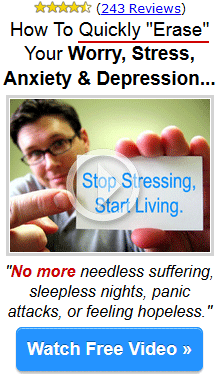Social Phobia
by National Insitute of Mental Health
"I couldn't go on dates or to parties. For a while, I couldn't even go to class. My sophomore year of college I had to come home for a semester."
"My fear would happen in any social situation. I would be anxious before I even left the house, and it would escalate as I got closer to class, a party, or whatever. I would feel sick to my stomach--it almost felt like I had the flu. My heart would pound, my palms would get sweaty, and I would get this feeling of being removed from myself and from everybody else."
"When I would walk into a room full of people, I'd turn red and it would feel like everybody's eyes were on me. I was too embarrassed to stand off in a corner by myself, but I couldn't think of anything to say to anybody. I felt so clumsy,I couldn't wait to get out."
Social phobia is an intense fear of becoming humiliated in social situations, specifically of embarrassing yourself in front of other people. It often runs in families and may be accompanied by depression or alcoholism. Social phobia often begins around early adolescence or even younger.
If you suffer from social phobia, you tend to think that other people are very competent in public and that you are not. Small mistakes you make may seem to you much more exaggerated than they really are. Blushing itself may seem painfully embarrassing, and you feel as though all eyes are focused on you. You may be afraid of being with people other than those closest to you. Or your fear may be more specific, such as feeling anxious about giving a speech, talking to a boss or other authority figure, or dating. The most common social phobia is a fear of public speaking. Sometimes social phobia involves a general fear of social situations such as parties. More rarely it may involve a fear of using a public restroom, eating out, talking on the phone, or writing in the presence of other people, such as when signing a check.
Although this disorder is often thought of as shyness, the two are not the same. Shy people can be very uneasy around others, but they don't experience the extreme anxiety in anticipating a social situation, and they don't necessarily avoid circumstances that make them feel self-conscious. In contrast, people with social phobia aren't necessarily shy at all. They can be completely at ease with people most of the time, but particular situations, such as walking down an aisle in public or making a speech, can give them intense anxiety. Social phobia disrupts normal life, interfering with career or social relationships. For example, a worker can turn down a job promotion because he can't give public presentations. The dread of a social event can begin weeks in advance, and symptoms can be quite debilitating.
People with social phobia are aware that their feelings are irrational. Still, they experience a great deal of dread before facing the feared situation, and they may go out of their way to avoid it. Even if they manage to confront what they fear, they usually feel very anxious beforehand and are intensely uncomfortable throughout. Afterwards, the unpleasant feelings may linger, as they worry about how they may have been judged or what others may have thought or observed about them.
About 80 percent of people who suffer from social phobia find relief from their symptoms when treated with cognitive-behavioral therapy or medications or a combination of the two. Therapy may involve learning to view social events differently; being exposed to a seemingly threatening social situation in such a way that it becomes easier to face; and learning anxiety-reducing techniques, social skills, and relaxation techniques.
The medications that have proven effective include antidepressants called MAO inhibitors. People with a specific form of social phobia called performance phobia have been helped by drugs called beta-blockers. For example, musicians or others with this anxiety may be prescribed a beta-blocker for use on the day of a performance.
How To Get Rid Of Phobias Naturally
Phobias and fears are common - over 10% of people experience a simple phobia at some time. From elevators, spiders and birds, to heights, dentists and open spaces... Everything is in our own mind. Did you know that it can be cured in a natural way, without medications? The most natural way to get rid of fear or phobia is to influence the place where it was created - your mind. The process is simple... We have created the list of the most common fears and phobias. Follow this link and choose the phobia you suffer from, and download your cure session!.

Freebies & Discount Codes
Find out freebies and coupons for savings on health products available on the Web



















